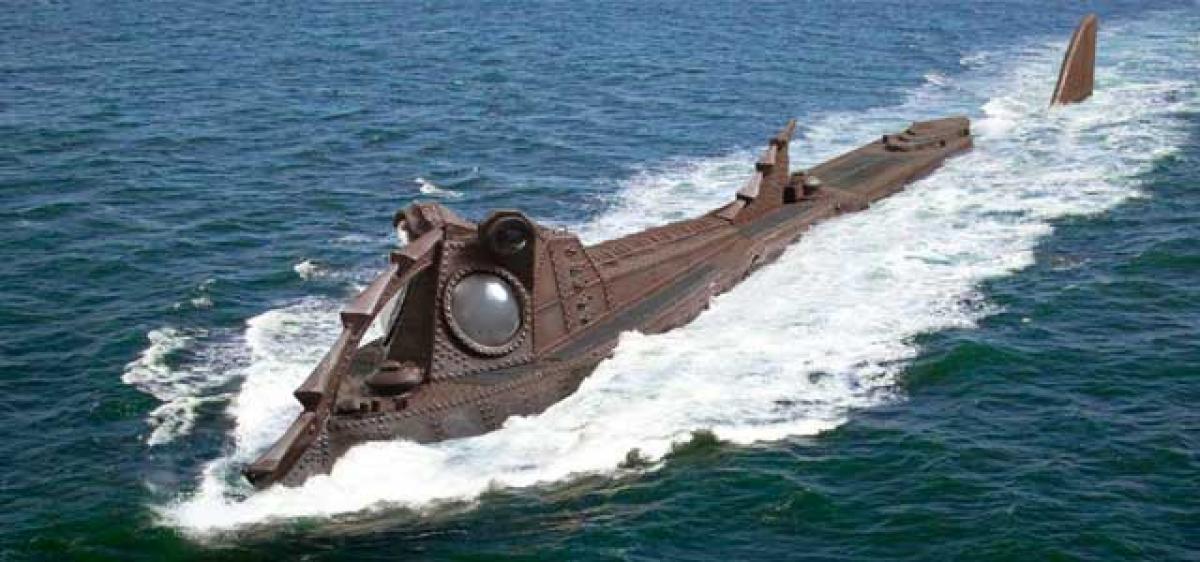Live
- Rural students told to pursue higher education
- Fishery activities get a big boost in TDP budget
- Today’s welfare measures aim to empower: Nirmala Sitharaman
- Six scholars, including two women, win Infosys Prize 2024
- Gurukula zonal level sports meet concludes
- Vagdevi Jr College student selected for national basketball tourney
- Maoist area committee member arrested
- Collectorate staff protest attack on DC
- Villagers urge authorities to continue launch service even after construction of bridge
- MLA Padmavathi launches free lunch for readers
Just In

This week I am going to introduce you to the work of a few authors whose imagination dwelt in the future. They foresaw what the consequences of advanced technology would be like in the distant future, and wove with their imagination stories rich in fantasy.
This week I am going to introduce you to the work of a few authors whose imagination dwelt in the future. They foresaw what the consequences of advanced technology would be like in the distant future, and wove with their imagination stories rich in fantasy.
The one author who would certainly rate a very high position in this genre is Jules Verne. While there are many novels written by him "20,000 Leagues Under the Sea" is, in my view, the most exciting of them all.
Set in a futuristic submarine vessel called the ‘Nautilus’, commanded by Captain Nemo, Verne's spectacular story takes us around the world in an enthralling trip underwater. And all this at a time when such a concept was hardly even dreamt of!
Even more gripping than the book is the movie based on it with the same name, in which yesteryear actors James Mason and Kirk Douglas portrayed their roles brilliantly.
"1984" is another novel of the same category authored by English author George Orwell. The setting of the book is in the fictional province ‘Air Strip One’, in the superstate ‘Oceania’ - featuring a world constantly at war, all pervading and continuous government surveillance, and political intrigue.
In the language created by the government ‘Newspeak’, ‘Ingsoc’ is the name given to a dictatorial regime called English Socialism. An executive elite unleashes a region that persecutes individualism and free thought is considered a ‘thought crime’ which is enforced by the so – called ‘thought police’.
On similar lines HG Wells, the British author, wrote science fiction and was, along with Jules Verne, probably the man who introduced the genre to the whole world.
A four time Noble Prize nominee, he wrote many books with "The Time Machine" and "The Invisible Man" probably being the best remembered.
There would hardly be anyone from my generation who would not remember the book called "2001 – A Space Odyssey". The author, Arthur C. Clarke, also penned a couple of sequels.
Clarke was not only a writer of science fiction but also took an active interest in developments in the field of space – travel during his lifetime, and had the gratification of seeing many of his predictions come true.
He was also the recipient of the Kalinga Prize awarded by UNESCO for popularising science. Movies produced based on his books proved extremely popular as also educative.
While on the subject of fiction based on futuristic thinking, I must also mention a few other works by great authors.
‘Brave New World’ is a novel written by Aldous Huxley. The plot is set in London in the year A.D. 2540(632 A.F. – as the passage of time in the book is based on a fictional scale called "After Ford" or A. F.)
This story foretells the manner in which reproductive technology will manifest itself in the future, and describes phenomena including manipulation and conditioning the human mind in order to alter societal conduct.
That book was followed by an essay "Brave New World Revisited", a subsequent essay and by "Island", another book by Huxley.
Paul Davies, an English physicist and writer, has authored many books which deal with science and technology and cosmology- my own favourite being "The Cosmic Blueprint."
Another noted writer Sir Isaac Asimov, though essentially a writer of scientific fiction and fantasy, authored the many other works which have helped popularise science and technology, explaining concepts in a manner related to history.
His best known scientific contribution is research on extraterrestrial life, including experimental demonstration of the production of amino acids from basic chemicals by radiation.
Asimov’s ‘Contact’ is a 1985 science fiction novel by American scientist Carl Sagan. It deals with the theme of contact between humanity and a more technologically advanced, extraterrestrial life form. A movie based on the book depicts spectacularly the vivid phenomena depicted in it.

© 2024 Hyderabad Media House Limited/The Hans India. All rights reserved. Powered by hocalwire.com







